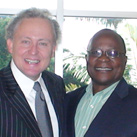Joyful Heart Surgery: Philippians series #3

The church of Philippi was greatly involved in the ministry of Paul because they loved him and they believed in what he was doing. Paul had begun this church ten years earlier. In return, Paul wrote this beautiful letter to them. It is obvious as you read this letter that this must be, indeed, his most beloved and favorite of all of the churches which he founded.
 As it has been indicated in earlier chapters, Paul wrote this from prison. You will notice in Philippians 1:7 that he talks about “my bonds,” and in Philippians 1:13 he says, “So that my bonds.” I don’t know about you, but if I had been writing a letter from the jail it would have been all about me. I would have been talking about how uncomfortable it was in the jail, and I probably would tell you how long the chain was that bound me. I would probably tell you how cramped I was and how bad the meals were. My letter would probably be all about me. Yet, Paul is in jail and the letter is all about them.
As it has been indicated in earlier chapters, Paul wrote this from prison. You will notice in Philippians 1:7 that he talks about “my bonds,” and in Philippians 1:13 he says, “So that my bonds.” I don’t know about you, but if I had been writing a letter from the jail it would have been all about me. I would have been talking about how uncomfortable it was in the jail, and I probably would tell you how long the chain was that bound me. I would probably tell you how cramped I was and how bad the meals were. My letter would probably be all about me. Yet, Paul is in jail and the letter is all about them.
Notice at the end of Philippians 1:4, he says, “Always in every prayer of mine for you all making requests with joy.” Note the little statement “with joy.” In the previous chapter, I shared that Grace and Peace are the twin sisters of the Gospel. Karen is our name for grace. Irene is our name for peace. Grace and peace go together in the Christian life. They are the twin sisters of the gospel. However, Grace and Peace have a little sister. Her name is Joy. So, when Grace and Peace show up, invariably their sister Joy will come with them.
Even though Paul highlights joy throughout this letter, he never gives the definition of joy. The word joy is the keyword in Philippians. Paul mentions it 18 times. Yet, as you read through it, you will not find anywhere that Paul gives a definition of joy. What you have in the book of Philippians is not a definition of joy but a demonstration of joy. Paul is filled with the emotion of joy.
How do you explain this? He is a man who is in jail. He’s going to lose his life by beheading down the road, and yet he can hardly write a sentence here in this book without making a reference to joy. Paul was a man of joy because his thoughts were filled not about himself but about other people.
Let me just teach you how to spell joy. J is Jesus first; O, others second; Y, yourself last.
When you put Jesus first in your life, others second in your life, and put yourself third, you have found the secret of joy.
There are three basic statements that Paul is making in these verses that I want to summarize for you. The first statement he is basically saying to them in these verses is, “I have you in my mind.” Philippians 1:3 says, “I thank my God upon every remembrance of you.” He’s thinking about them and he remembers them. They are in his memory bank. Every time he thinks of these people his heart is filled with joy.
I wonder what people think about when you are mentioned. What kind of emotions come up in their mind and heart when they hear about you?
Then, in Philippians 1:4 he says, “I have you in my prayer.” The text says, “Always in every prayer of mine for you all.” By the way, he gives you a good definition of prayer there in the rest of that verse. He says, “Making request with joy.” I think the best definition of prayer I’ve ever read is that prayer is asking God.
 In Philippians 4:6, we read, “Be careful for nothing, but in everything, by prayer and supplication with thanksgiving, let your requests be made known unto God.” That’s what prayer is. Prayer is asking God. Jesus taught this. Jesus said, “Ask and it shall be given. Seek and ye shall find. Knock and it shall open unto you.”
In Philippians 4:6, we read, “Be careful for nothing, but in everything, by prayer and supplication with thanksgiving, let your requests be made known unto God.” That’s what prayer is. Prayer is asking God. Jesus taught this. Jesus said, “Ask and it shall be given. Seek and ye shall find. Knock and it shall open unto you.”
Paul says to the church Philippi, “I have you in my mind.” He says, “I have you in my prayer.” He says that it is a joy for me to pray for you.
Let me ask you a question. When people pray for you is it an occasion of joy? When people pray for you do they do it with tears of grief and anxiety and heartache? Or is it a joy for people to pray for you when they pray?
“I have you in my mind. I have you in my prayers.” Then note Paul says in Philippians 1:7, “I have you in my heart.”
We should keep people in our hearts. Sometimes people get on our nerves. Some people get on your neck. Do you know what I’m talking about? He or she gives me a pain in the neck. Then, some people get on your stomach. They cause you ulcers. They make you sick to your stomach when you think about them.
Do you remember in the Old Testament the high priest when he would go into the Holy of Holies? The Bible taught us that he had a breast plate and had 12 beautiful stones on that breast place. On that breast plate, was engraved the names of the tribes of the children of Israel. Do you know what that symbolized? It symbolized that when the high priest went into the presence of God, he went with the names of God’s people on his heart.
We are going to see what is in Paul’s spiritual heart. What’s in Paul’s heart ought to be in our heart as well.
I. We Can Have The Comfort of Communion
 When we open up Paul’s heart we find the joy of communion. We read in Philippians 1:5, “For your fellowship in the gospel from the first day until now.” I’m using the word communion for the word fellowship. “Your communion, your fellowship, in the gospel from the first day until now.”
When we open up Paul’s heart we find the joy of communion. We read in Philippians 1:5, “For your fellowship in the gospel from the first day until now.” I’m using the word communion for the word fellowship. “Your communion, your fellowship, in the gospel from the first day until now.”
In the first chapter of Philippians, we find that Paul, over and over again, refers to the Lord Jesus Christ, and he refers to the gospel, over and over, all through this chapter. There are three phrases in this chapter that I want you to note. In verse 5, he talks about your fellowship in the gospel. Then, in verse 12, he writes about the furtherance of the gospel. In verse 27, the end of the verse, he says, “Striving together for the faith of the gospel.”
He starts off with the fellowship of the gospel. What does he mean by the word fellowship? The Greek word for fellowship is koinonia. The word fellowship means different things to different people. The word fellowship literally means “to have in common.” It means to be interested in the same things as someone else. Somebody says that fellowship means two fellows in the same ship. That’s not a bad way of looking at it.
Paul is talking about fellowship, but he’s talking about it on a spiritual plane. In Philippians 2:1, you will notice that he says, “If any fellowship of the Spirit.” Thus, Paul is talking about something spiritual that brings people together. “Your fellowship in the gospel.” Paul is explaining when you receive Jesus as your Lord and Savior, you are born into the family of God. By that new birth experience, you are brought into fellowship with the Lord Jesus Christ.
I Corinthians 1:9, says, “God is faithful, by whom ye were called unto the fellowship of his Son, Jesus Christ our Lord.” When I am saved, I am brought into fellowship with Jesus Christ. I now have communion and a relationship with Jesus Christ. But that’s not all. When you come to the Lord, you are not only brought into fellowship with Jesus, but you are brought into fellowship with every born again believer.
In I John 1:3, it says, “That which we have seen and heard declare we unto you, that ye also may have fellowship with us; and truly our fellowship is with the Father, and with his Son, Jesus Christ.” When I’m saved I’m brought into fellowship with Jesus. When I am saved I am brought into fellowship with all my brothers and sisters in Jesus. If you do not know Christ as your Savior or you have a friend who doesn’t know the Lord as their Savior, you may be their friend and have friendship with them, but you don’t have fellowship with them. Jesus turns friendship into fellowship!
Then, Paul adds a little something else at the end of verse 7. He says, “Ye all are partakers of my grace.” “Partakers” is the same word. You are in fellowship. You have fellowship in grace. When you come to the Lord you are now a partner in grace with the people of God.
II. We Can Have The Confidence of Completion
 In Philippians 1:6, we observe something else in Paul’s heart. We see the assurance of completion. It is an assurance that has to do with God’s great work of salvation in their hearts. He says, “Being confident of this very thing. That he who hath begun a good work in you will perform,” that is, will finish it, “unto the day of Jesus Christ.”
In Philippians 1:6, we observe something else in Paul’s heart. We see the assurance of completion. It is an assurance that has to do with God’s great work of salvation in their hearts. He says, “Being confident of this very thing. That he who hath begun a good work in you will perform,” that is, will finish it, “unto the day of Jesus Christ.”
When he talks about the good work, he’s talking about salvation. He’s talking about God’s good work of salvation. He’s basically saying that I am assured that this great work of salvation which God has begun in your life, that God will carry it on out unto completion, that the day of salvation is the guarantee of the day of completion.
Let’s look at the initiation of the good work. Paul says, “Being assured of this very fact, this very thing, that he who hath begun a good work in you.” Christ has begun a good work in you. Paul writes, “He has begun,” then he says, “He will perform it until the day of Jesus Christ.”
There are three days mentioned in verses 5 and 6. In verse 5, he says, “From the first day until now.” That was the present day. Then, in verse 6, he talks about the day of Jesus Christ. The first day he is talking about the day they got saved, the day they met Jesus. He says, “I remember the first day.”
We believe that Lydia and the slave girl and the jailer were probably sitting in the congregation when this letter was read. Paul said, “I remember the first day when you came to Jesus.” I can almost imagine Lydia sitting there and saying, “I remember the first day too. I was out at the riverside prayer meeting and Paul opened up the Scriptures and the Lord opened up my heart and I got saved that day. Yes, I remember the first day.”
Probably that slave girl said, “I remember that first day. I was a demon-possessed girl, running along after Paul, and he turned and rebuked the demons and the demons came out and Jesus came in. Yes, I remember the first day.”
The jailer says, “I remember the first day. It was at night. I was right on the verge of suicide. I thought that all of the prisoners had been released because of the earthquake. I was getting ready to put a sword in my heart. I remember that I got saved. I remember that day quite well.”
I want to ask you a question. Do you remember the first day? Have you had a first day? Do you remember when you came to Jesus? I do. I was saved on a Sunday morning in Montgomery, Alabama. I remember my first day. I asked the Lord Jesus to forgive me of my sins and come into my heart and save me.
When was your first day? Were you in your home and did somebody come and introduce you to Jesus and you accepted Him and that was your first day? Maybe you were sitting in a building and came to Christ. Then, that was your first day. “From the first day until now.” How is it going?
Notice that it says, “Being confident of this very thing, that he who hath begun a good work.” That’s the initiation of it. It’s God who does the good work. Did you notice that? It’s God who does it.
It’s not our work. Ephesians 2:8, says, “For by grace are ye saved through faith; and that not of yourselves, it is the gift of God. Not of works, lest any man should boast.” But then verse 10 says, “For we are his workmanship.” Salvation is not because of your works or my works. It’s because of His good work. God does the work. Salvation is of the Lord. He initiates it.
I like to put it this way when it comes to our salvation. God thought it. Jesus bought it. The Holy Spirit wrought it. The devil fought it, but praise God, I got it!
 Notice not only the initiation of the good work, but he talks about the location of the good work. Where is God doing this good work of salvation? He says in verse 6, “Being confident of this very thing, that he who hath begun a good work,” where? “In you.” He’s doing His good work of salvation in believers.
Notice not only the initiation of the good work, but he talks about the location of the good work. Where is God doing this good work of salvation? He says in verse 6, “Being confident of this very thing, that he who hath begun a good work,” where? “In you.” He’s doing His good work of salvation in believers.
God is working in the world, of course. Somebody said, “Let’s just find where God is working and let’s get in on it.” God’s working everywhere. This is our Father’s world. God is at work everywhere. God is doing His good work in this world, but He is doing His good work in the hearts and lives of people. It’s an inside job.
You and I are under construction. God’s doing a work in our lives. The word “workmanship” in Ephesians 2, verse 10, is where we get our word poem. We are God’s poem. The picture here is like a diamond in the rough. They find this diamond and they take it and they clean it and they polish it and they shape it. God is doing a good work in you.
What is God doing in you? Why did God save you? What’s the purpose of God’s good work in you? In Romans 8, verse 29, it says, “For whom he did foreknow, he also did predestinate to be conformed to the image of his Son.” Do you know why God saved you and what God’s doing with you? God is making you like Jesus. You say, “God isn’t doing too well. I’m not a whole lot like Jesus.” I know that. I’m not a whole lot like Jesus either. But that’s what God is doing in my life. Ultimately, God is going to make you and me like Jesus.
I heard about a sculpture. He had this big chunk of marble. He was just chiseling away. Somebody came by and said, “What are you doing?” He said, “I’m chiseling a horse.” The guy looked at that chunk of marble and said, “You are chiseling a horse? I don’t see a horse there. How are you chiseling a horse out of that big chunk of marble?” The sculpture said, “It’s real easy. I just chip away everything that doesn’t look like a horse.”
There are things in our life that are not like Jesus. God just chips away and one of these days all the superfluous is going to be taken away from our life, and we are going to be in the image of His son. He’s doing His work in us.
Notice that he goes on and he says, “I’m confident that he who hath begun a good work in you will perform it.” It is the word finish it, “until the day of Jesus Christ.” That is the completion of God’s good work. “The day of Jesus Christ.” He will accomplish His good work. God never started a project that He didn’t finish. You can’t say that about the government. They have started a lot of things that they have never finished. But you can say about God that every project God ever starts, He finishes.
It was true of creation. Genesis 2:1, “Thus the heavens and the earth were finished.” He started His creation work. He finished His creation work. The same is true about the work of redemption that Jesus did on the cross. On the cross, Jesus shouted, “It is finished.” He finished the work of redemption to make possible our salvation.
One of these days God has said that the good work I have started in you, I’m going to finish. You are going to be like Christ. You are going to be in heaven forever.
III. We Can Have The Conscientious of Compassion
 When we open Paul’s heart what do we see? So far, we have seen communion and confidence. We have seen the joy of communion, fellowship in the gospel. Afterwards, Paul gave us the warmth of compassion.
When we open Paul’s heart what do we see? So far, we have seen communion and confidence. We have seen the joy of communion, fellowship in the gospel. Afterwards, Paul gave us the warmth of compassion.
In verse 8, we read, “For God is my record, how greatly I long after you all in the bowels of Jesus Christ.” Paul has a compassion for these people which is deeply emotional. When he says, “I greatly long after you,” the word there means to pursue. It means to go all out. It is an all-out kind of love.
Love is a decision. A lot of young people getting married think that love is just an emotion. They say, “You just fall into it. I just have puppy love.” You had better be careful with puppy love. It could lead to a dog’s life.
Do you remember how you felt when you went off to college and got home sick? “How great I long after you in the bowels of Jesus Christ.” You ask, “Why did they translate it to the bowels of Jesus Christ?” Because that is exactly the meaning of the Greek word, “the bowels.” The Greeks believed that the inner organs were the seat of the emotions.
People used to laugh at the very idea that our emotions affect our inner organs or our inner organs affect our emotions. We don’t laugh anymore. We know that that is exactly true. Have you ever heard that song, “I love you so much it hurts me?” Love is painful sometimes.
Love affects the organs. It can cause ulcers. Love means inner affections. “I love you with the inner affections.” It’s an emotional thing. That’s the way we should love our brothers and sisters in the Lord. That’s the way we should love lost people. It should be an emotional thing.
But not only is it an emotional thing, but it’s also a supernatural thing. Notice what Paul says. He’s very careful in his language. He doesn’t say, “I love you with my affections.” That’s not what verse 8 says. He says, “I long for you all in the affections,” not Paul’s affections but the affections of “Jesus Christ.” We’re doing spiritual heart surgery on Paul. When we open Paul’s spiritual heart, we make a startling discovery. There’s another heart in there. It is the heart of Jesus Christ. “I long after you all in the tender affections of Jesus Christ.”
You can set out every day of your life to love people. You can make up your mind, “I’m going to love people today.” However, you will come to the realization that you cannot really love people without “the affections of Christ.” Think about it for a moment.
On one occasion, Jesus said, “If you are struck on the cheek, turn the other also. If you are robbed, give your jacket also. If you are commanded to go one mile, go two miles” (Matt. 5:41ff). Naturally, we cannot achieve this. It is a supernatural thing. We are to love people with the affections of Christ. The first mile is a trail but the second mile is a smile!
Back To Blog




